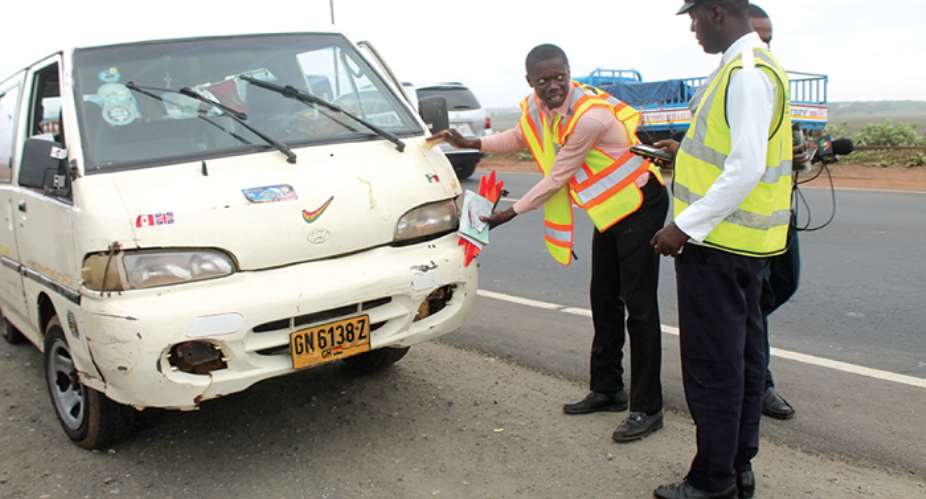By end of June this year, the Ghana Police Service will begin the implementation of Legislative Instrument (LI. 2180) which grants police the power to issue spot fines against drivers who offend the road and traffic regulations.
The Executive Director of the National Road Safety Commission (NRSC), Mrs May Obiri-Yeboah, disclosed this at a national dialogue event on the menace of road accidents organised by the West Africa Nobles Forum (WANF) Wednesday May 29, this year.
According to him, after seven years of the passage of the road traffic regulation, L.I 2180, it was now time to operationalise the spot fine system.
She expressed optimism that the coming into force of the spot fines, the menace of reckless and undisciplined driving leading to avoidable accidents on the roads would be reduced if not end.
Some of the offences that would incur the spot fines include jumping the red light, driving without a seatbelt, driving without licence and the use of inappropriate or non approved licence for vehicles.
Additionally, drivers who over speeds, wrongful parking, failure to carry a fire extinguisher, refusal to renew roadworthy certificate, use of unspecified tinted glass, driving a vehicle without reflectors and failure to wear protective clothing while on a motorbike.
Other offences include driving on the shoulders of the road, talking on phone while driving, use of a foreign driving licence and obstruction at intersection or pedestrian crossing.
The spot fine would also cover minor traffic offences such as non-conformity with restrictions on horns and sirens, driving by underage persons and using a motorcycle or tricycle for commercial passenger services.
The spot fine system was introduced to quicken the administration of justice for minor traffic offenders and also help increase compliance with road traffic regulations and reduce indisciplined acts by drivers.
The system would be linked to the database of the Driver and Vehicle Licensing Authority (DVLA) register to make it possible for police in every part of the country to easily track down offenders.
Again, police officers who would enforce the roads would not have physical contact with the offender money, but simply issue tickets to the offender to pay stipulated fines at commercial banks and at other approved digital platforms.
The system was supposed to be implemented in May 2015 but had to be suspended after public outcry over inadequate public education on its operations, been the first time.
Stakeholders including transport and drivers unions were also in disagreement over who should collect the fines as drivers and their union leaders believed some of the police officers could abuse the system.
Sources: Modernghana with files from daily graphic
.






 Elisu By-election: "If you call yourself a man, boo Chairman Wontumi again" — Bo...
Elisu By-election: "If you call yourself a man, boo Chairman Wontumi again" — Bo...
 Fuel tanker driver escapes with his life after tanker goes up in flames near Suh...
Fuel tanker driver escapes with his life after tanker goes up in flames near Suh...
 Uniform change: ‘Blue and white are brighter colours’ — Kwasi Kwarteng explains ...
Uniform change: ‘Blue and white are brighter colours’ — Kwasi Kwarteng explains ...
 MoE not changing all public basic school uniforms but only newly built ones — Kw...
MoE not changing all public basic school uniforms but only newly built ones — Kw...
 We’re only painting new public basic schools blue and white – Dr. Adutwum clarif...
We’re only painting new public basic schools blue and white – Dr. Adutwum clarif...
 Bawumia has lost confidence in his own govt’s economic credentials – Beatrice An...
Bawumia has lost confidence in his own govt’s economic credentials – Beatrice An...
 I fought WW2 at age 16 – WO1 Hammond shares At Memoir Launch
I fought WW2 at age 16 – WO1 Hammond shares At Memoir Launch
 GRA-SML deal: Regardless of what benefits have been accrued, the contract was aw...
GRA-SML deal: Regardless of what benefits have been accrued, the contract was aw...
 April 26: Cedi sells at GHS13.75 to $1, GHS13.18 on BoG interbank
April 26: Cedi sells at GHS13.75 to $1, GHS13.18 on BoG interbank
 Champion, promote the interest of women if you become Vice President – Prof. Gya...
Champion, promote the interest of women if you become Vice President – Prof. Gya...
